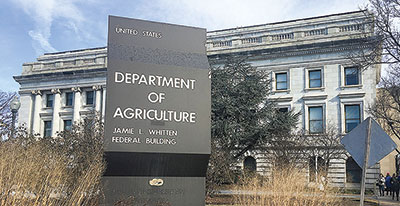USDA workforce has few options as agency refuses to bargain

Ten thousand workers at the United States Department of Agriculture (USDA) will be forced to work under a “collective bargaining agreement” (CBA) that is being forced upon them by the Trump administration.
In an effort to sideline the union, American Federation of Government Employees (AFGE) Local 1106, the USDA announced that effective July 20, a new contract would go into effect even though the union has not agreed to it. Two previous proposals were rejected by the union, one in 2018 and one just last month.
While the department is calling it an agreement, it is not, but rather a one-sided contract. In a letter from the USDA’s general counsel Stephen Vaden, the department claims that the union doesn’t want to agree on a successor deal, so they have no choice but to implement this new collective bargaining agreement.
What were the issues holding up the contract? Joshua Rider, the president of AFGE Local 1106, told Bloomberg that schedule flexibility, union representation in grievances, and other rights afforded in the prior contract were stripped from the new agreement.
“This is management repudiating the right that unions have under the statute to ratify its agreement. I think it’s been a clear assault across the federal government on union organization and collective bargaining rights,” Rider said.
OTHERS FACING SAME PROBLEM
The workers at USDA aren’t the only ones who are dealing with this. (See story below.)
Workers at the Education Department and the VA are dealing with similar issues. An executive order that Trump signed orders all departments to reopen contracts and insert language in them that limits certain union rights including official union time and kicking unions out of their offices on federal property.
Although Trump’s Executive Order was instituted nearly a year ago, Vaden may be acting now because Trump has recently nominated him to be a judge of the U.S. Court of International Trade.
UNIONS CAN’T CHALLENGE
While Trump is trying to institute these agreements across the government, unions are largely blocked from contesting them.
Why? Because to challenge them, they would have to go to the Federal Labor Relations Authority (FLRA), which doesn’t currently have a general counsel. As such, there is no one at the agency to prosecute the administration for violating the contracts or failing to negotiate in good faith.
And, as the FLRA general counsel would also have to be appointed by Trump, it is unlikely that they would choose to pursue a case against the administration. While Local 1106 could bring the case to the Federal Service Impasses Panel, the union says they, too, have also been unwilling to reign in the Trump administration.
WEAKENING FEDERAL UNIONS
The real goal of this move is to further weaken federal unions.
By unilaterally implementing a contract, Trump’s USDA is taking away the union’s main power, the right to bargain. This is an unprecedented move.
Todd Dickey, assistant professor of public administration and international affairs at Syracuse University’s Maxwell School, said he has never seen a federal agency try to unilaterally institute a new contract on their workforce.
Trump is clearly trying to see how far he can push his executive power before the courts will stop him. If they don’t, it could mean the end of collective bargaining for federal workers.
(Edited from UCOMM blog)
St. Louis AFGE feels impact of Trump assault
The assault on St. Louis AFGE unions has been no less severe, notes AFGE Local 96’s newly elected President Jonay McCall.
 With the government’s new contract interpretations, “Management can do almost anything they want to do, and the law makes it difficult for the union to protect our members.”
With the government’s new contract interpretations, “Management can do almost anything they want to do, and the law makes it difficult for the union to protect our members.”
As a result, union membership has decreased and new employees are reluctant to join.
“That’s what the Trump administration wants to happen. Take away our funding so we can’t fight as effectively for our members,” she stressed.
Before Trump:
- Office space: the government unions had no cost, but limited, office space in the facilities they represented. Now, if they want an office, they have to rent it. The rent, for example, for Local 96’s two small offices at John Cochran Hospital and one small office at Jefferson Barracks Hospital, equaling about 600 sq. feet of space, went from zero to $49,165 a year! They, and the other 11 AFGE locals in St. Louis, moved out and are now in rented spaces throughout the St. Louis area.
- Representation time: Union staff could service their members on government time.
Now they are allowed only 10 hours a week to do union business on the job. McCall said as a result, she spends 40-50 hours of her own time a week on the union’s business. She works a seven-day on seven-day off schedule, so she has to use her personal time for the union’s work. “And that hurts my family because I’m not at home as much.”
WORKERS’ SUFFERING
And because union reps or stewards are not always immediately available when a member is suddenly called up on a charge, having no union opposition at a disciplinary meeting results in the members losing out. The District AFGE then steps in but with only one AFGE national rep in St. Louis, there is both a time lag and a substantial expense for the local when legal representation is needed.
Since her election last month, the union has lost five grievances this way. All are on appeal.
“The employees are trying to do their jobs, but they are suffering. And that’s the way the Trump Administration wants it,” McCall said ruefully.

